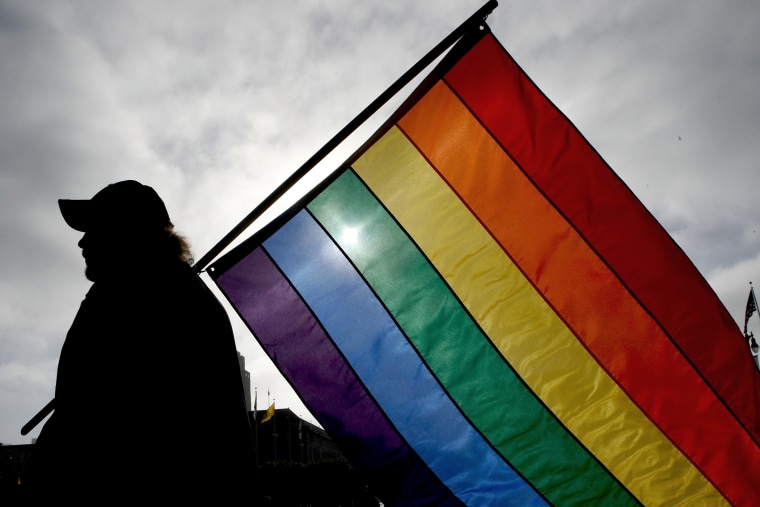Mississippi quietly passed its "religious freedom" law Tuesday, prompting alarm from gay and lesbian rights activists who say it could be used to justify discrimination in the name of religion.
The Mississippi version is narrowed from the religious freedom proposals championed by religious conservatives across the country, and now largely mirrors the federal Religious Freedom Restoration Act.
"While this is an improvement upon the language that the legislature previously contemplated, it still falls short," said Eunice Rho of the American Civil Liberties Union. The ACLU had pushed for specific language that would prevent the bill from being used to protect discrimination in the name of religion.
"The language still exposes virtually every branch, office, and agency of the government to litigation, which will require taxpayer funds to defend," Rho said.
Republican state lawmakers, spurred by cases in states like New Mexico and Colorado where businesses were prevented from turning away same-sex couples because of laws barring discrimination on the basis of sexual orientation, have sought to pass bills that create or strengthen religious exemptions. Many were modeled after the federal Religious Freedom Restoration Act, but with new provisions stating explicitly that business owners could use their religion as a legal defense if sued by a customer -- legal language specifically designed to protect business owners in cases like those in New Mexico and Colorado. Mississippi has no state laws barring discrimination on the basis of sexual orientation.
Proposed in about a dozen states, all of these bills have faced significant backlashes, both from LGBT rights activists and business organizations, and until now they have all failed. Arizona Republican Governor Jan Brewer vetoed one in February, after the business community and both U.S. Senators, both Republicans, came out against the bill.
In mid-March, Mississippi shelved its version after facing a backlash similar to what has been seen in other states where such bills have been introduced. But the version that passed Tuesday is nearly identical to the federal religious freedom law, with the exception of a provision that prevents employees of private businesses from filing religiously-based claims against their employers.
By adopting language that mirrors federal law, Mississippi lawmakers who backed the bill assuaged the concerns of the business community that the proposal could lead to discrimination.
"The legislature understands the need to follow the federal approach, and if they do that we're fine, we're not going to have a discrimination problem," Blake Wilson of the Mississippi Economic Council told msnbc Monday afternoon before the final bill emerged. The MEC functions as the state's chamber of commerce, and has been in contact with Mississippi lawmakers regarding the bill.
"We've been in plenty of contact with the key folks, and we've distributed our position extensively in both houses," Wilson told msnbc Monday.
Prior to the revisions by Mississippi lawmakers, the MEC had opposed passage of the bill. With the business community on board, there were few remaining obstacles to Mississippi being the first state to pass a religious freedom law since the most recent push began.
Yet contrary to the beliefs of the Mississippi Economic Council, religious right activists clearly envision the Mississippi law as empowering businesses to discriminate against same-sex couples in the name of religion. Shortly after the Mississippi law passed, Tony Perkins, head of the Family Research Center, released a statement saying as much.
"Whether it's someone like Pastor Telsa DeBerry who was hindered by the Holly Springs city government from building a new church in the downtown area, or a wedding vendor, whose orthodox Christian faith will not allow her to affirm same-sex 'marriage,' the provisions of RFRA would apply to prevent the government from discriminating against religious exercise," Perkins said. "The Founders never envisioned a government forcing Americans to choose between the basic teachings of their faith and losing their livelihood."
The Family Research Center's website states that the group opposes "the vigorous efforts of homosexual activists to demand that homosexuality be accepted as equivalent to heterosexuality in law, in the media, and in schools. "
As msnbc has previously reported, civil liberties groups originally backed the federal law that Mississippi's version closely resembles. Their opposition to such a law now has to do with how the courts have begun to interpret the scope of religious freedom laws, as not only protecting individual religious exercise but also actions that affect third parties, such as a florist turning away a customer who is purchasing flowers for a same-sex wedding. LGBT rights supporters don't believe businesses that serve the general public should be able to discriminate against customers on the basis of sexual orientation.
A group of legal scholars opposing the bill wrote to Mississippi legislators in March, arguing that in light of recent court decisions, laws designed to defend religious freedom and seemingly neutral in intent could be used to undermine protections against discrimination. "Twenty years ago, the Religious Freedom Restoration Act might have been less fraught with legal and policy peril," they wrote. "Now, when it will most likely be both seen and used as a shield against enforcement of civil rights laws (current and future), enacting it seems like a uniquely poor idea."
